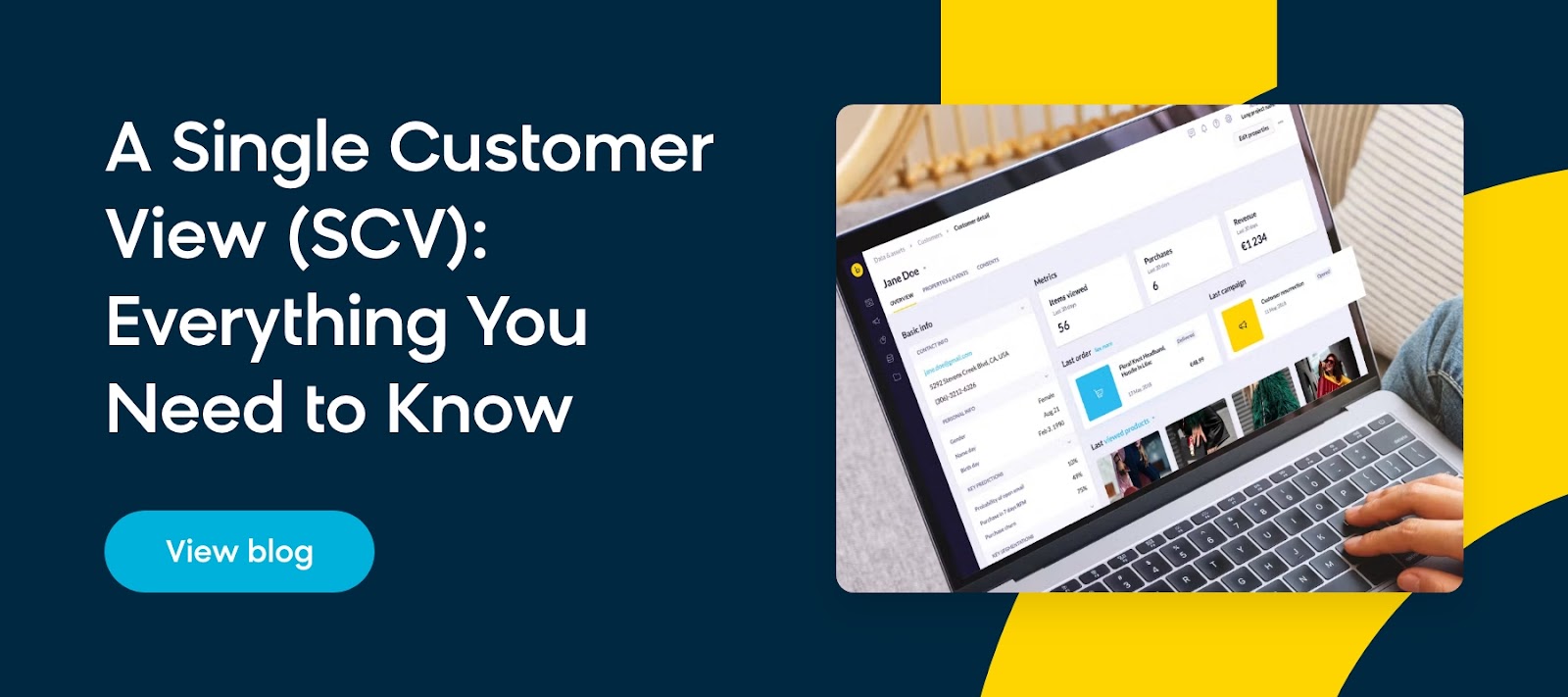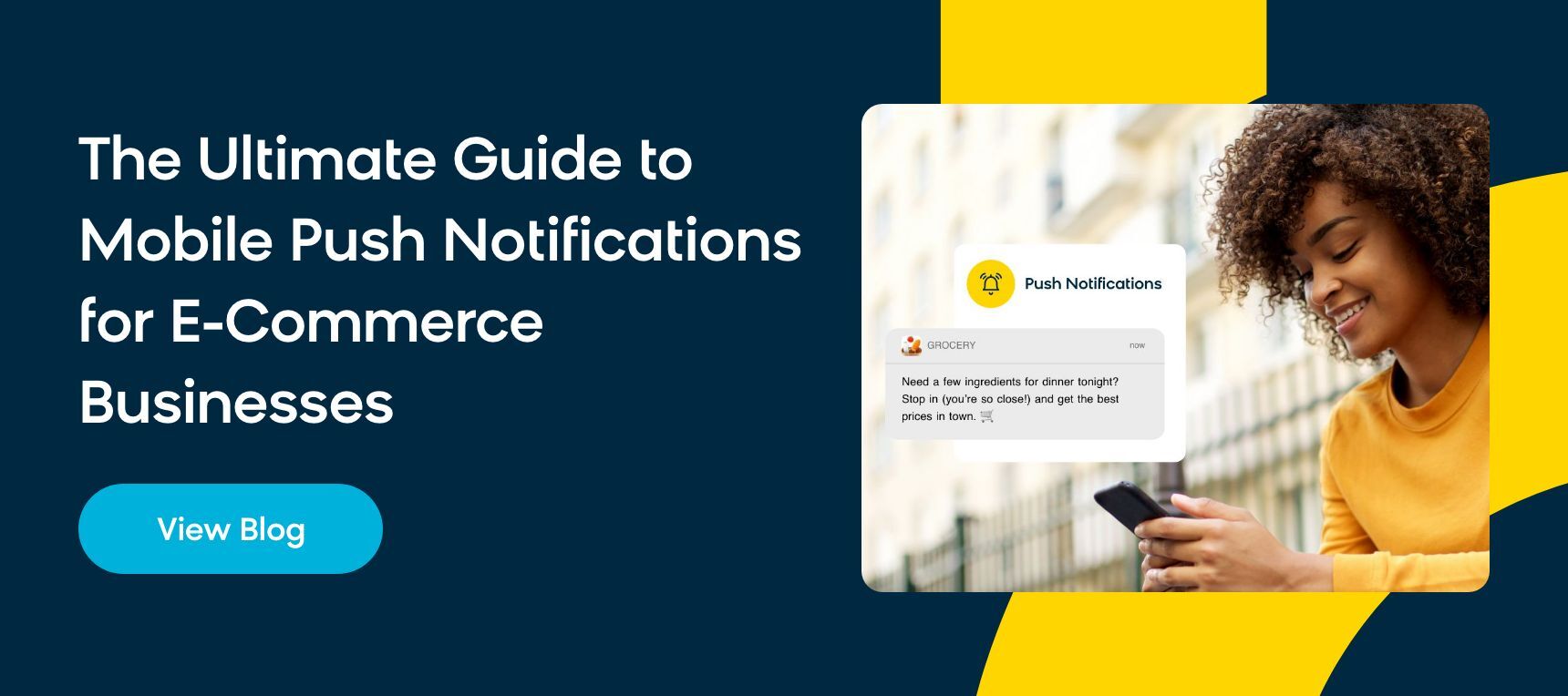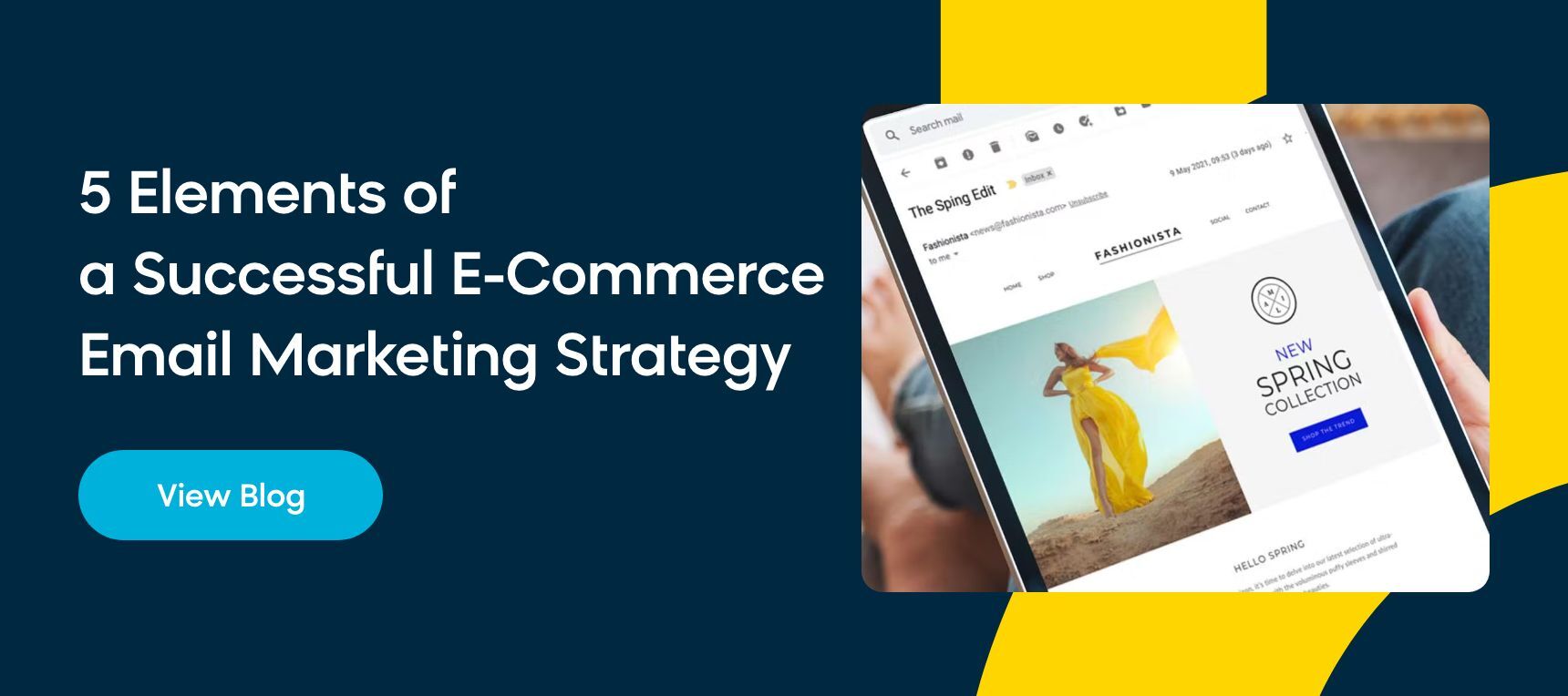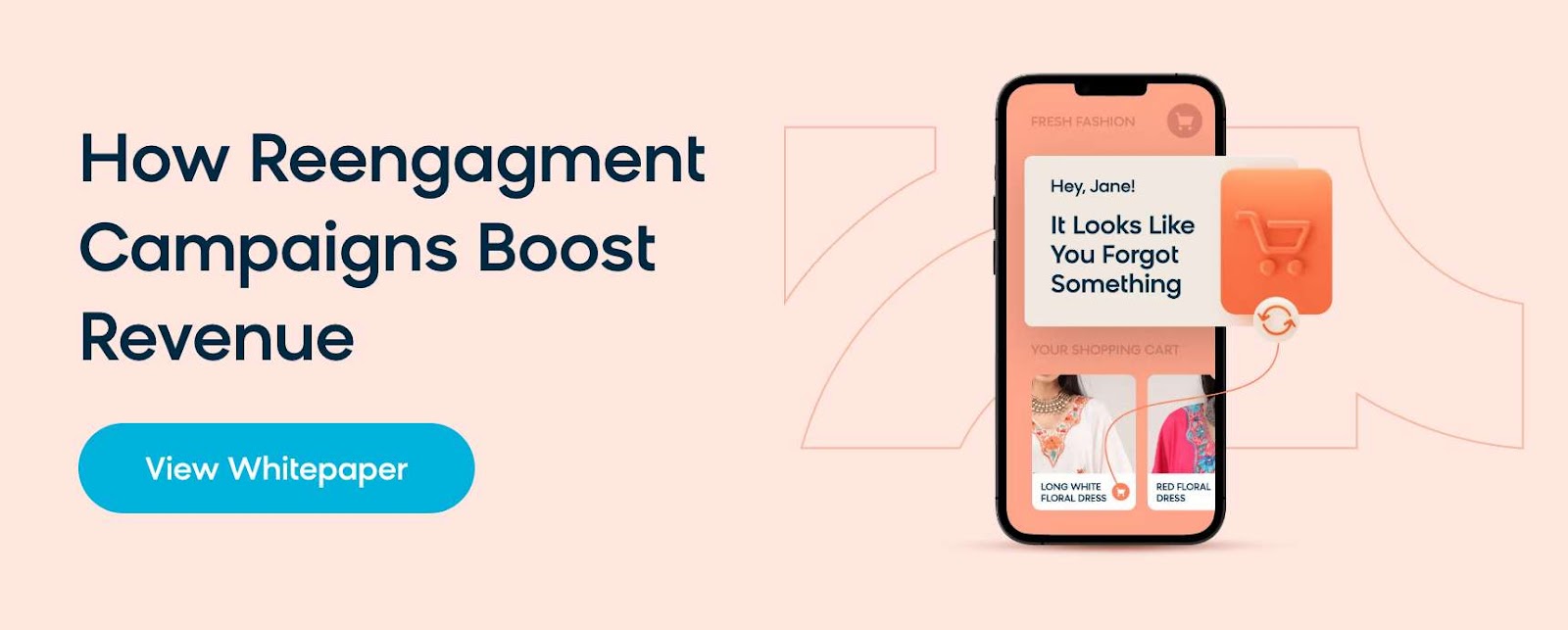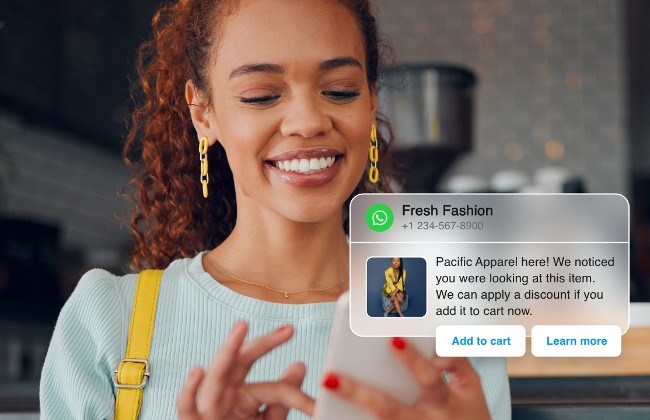The Future of Mobile Marketing and Why It Is Here To Stay
By Carl Bleich
03/27/2024

Whether you realize it or not, mobile marketing is ingrained into the fabric of our lives and has carved out a niche that will likely never be replaced.
In fact, mobile has literally become the centerpiece of most customer experiences. The vast majority of web browsing, search engine queries, video consumption, email opens, and social engagement now occurs on mobile devices.
Think about it smartphone users — when was the last time you checked your mobile device, tapped on a mobile app, or received a marketing message on your phone? You likely get more than one mobile marketing campaign or mobile message per day from mobile websites, like a package arrival alert, a reminder for your upcoming doctor’s appointment, a deposit in your bank account, a flight delay, and so on.
These are essential updates that allow us to go about our everyday lives, and receiving them via mobile makes it convenient and streamlined. Effective mobile marketing strategies reach a target audience with a relevant message in a very similar way to those pertintent mobile messages.
That’s why mobile marketing is such an important aspect of any business’ overall strategy. It’s everywhere, and if you want your business to stay top of mind for your customers, you need to make your brand as accessible as possible for mobile device users.
What Is Mobile Marketing?
Mobile marketing is a multi-channel online marketing technique focused on reaching a specific audience on their smartphones, tablets, or other mobile devices. The channels used to reach them can include websites, email, SMS, social media, or other mobile applications.
The goal of mobile marketing is to provide consumers with personalized information that promotes goods and services and offers key reminders that enrich the lives of those opted in to receive notifications.
Similarly, mobile app marketing is a term used to describe the act of marketing to users through an app. This is another impactful way of reaching customers through their smartphones.
Why Is Mobile Marketing So Effective?
Mobile marketing has boomed in popularity in recent years for one simple reason: People across the world have become more attached to their mobile devices.
Mobile Is the Default Way We Go Online
The proof of this can be found everywhere you look. Basically everyone has a smartphone, everyone is interconnected, and everyone uses their mobile devices to research, shop, and engage with the brands they love.
2021 saw nearly 15 billion mobile devices operating worldwide, and that number is only expected to climb. By 2025, the number of devices is projected to exceed 18 billion.
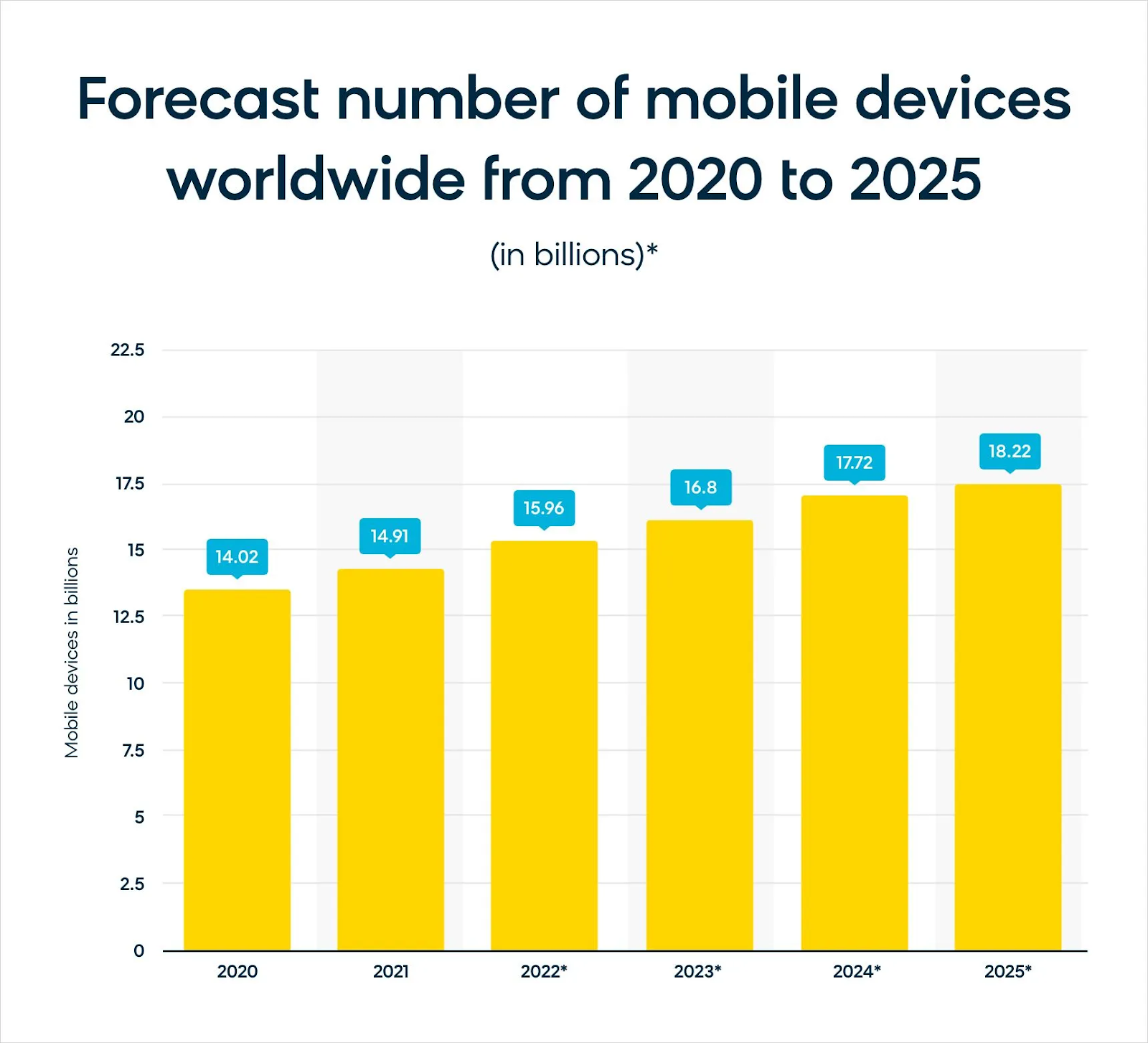
And with mobile phones currently contributing to more than half of all internet traffic, it’s easy to see that mobile marketing is no longer a nice addition to your marketing strategy. It’s an essential element for your business’ future.
Customers Want To Purchase via Mobile
While there were fears a few years ago that consumers would be reluctant to purchase via mobile, mobile retail ecommerce sales have only gone up. They exceeded $430 billion in 2022 and are projected to reach $710 billion by 2025.
That’s 44% of ecommerce sales, all done on a mobile device.
Mobile is on track to facilitate a majority of online purchases in just a few years, which is why brands need to shift their focus to mobile marketing for the future.
What is Mobile Marketing Automation?
Mobile marketing automation is an advanced, intelligent strategy that has quickly become a game-changer for ecommerce companies.
It's not just about sending out mass messages to your customers anymore. Mobile marketing strategies have evolved into a robust, data-driven approach that allow businesses to connect with their customers on a personal level, right at their fingertips.
At its core, mobile marketing automation leverages technology to automate repetitive tasks related to mobile advertising. This includes everything from scheduling push notifications, in-app messages, emails, and SMS to segmenting customers based on behavior, preferences, and purchase history. The goal? To deliver personalized, timely, and relevant mobile marketing campaign that resonates with each individual customer.
But what makes mobile marketing automation truly powerful is its ability to collect and analyze user data in real time. This enables companies to understand their customers better, predict future behavior, and tailor their marketing efforts accordingly. The result is highly targeted campaigns that drive engagement, boost conversions, and ultimately, increase revenue.
For ecommerce companies, this can make a world of difference. In an industry where competition is fierce and customer loyalty is hard-won, being able to connect with your customers on a personal level can set you apart from the crowd. Mobile marketing automation allows you to do just that, all while saving time and resources.
Furthermore, it provides valuable insights into your customers' shopping habits, preferences, and behaviors, helping you fine-tune your marketing strategy and make data-driven decisions. Whether it's identifying high-value customers, predicting future purchase trends, or retargeting customers who have abandoned their shopping carts, mobile marketing automation provides the tools and insights necessary to drive growth and success in the ecommerce industry.
Types of Mobile Marketing
In today’s market, customers have evolving preferences for how they want to access your products or services. Your audience isn't just signing onto your website from desktop computers anymore — there are multiple mobile touchpoints that you can use to connect with customers where it counts.
Social Media Marketing
If you’re wondering where to begin with your mobile marketing strategy, social media is a great place to start. It’s one of the most important and popular mobile channels available to businesses.
Apps like Facebook, Instagram, and TikTok have become synonymous with the mobile experience, and being accessible to your audience on these platforms should be a foundational part of your marketing strategy.
The strong conversion potential of these apps makes it well worth the effort of maintaining a social media presence. These platforms boast billions of mobile users who are actively engaged, and the average conversion rates from social ad spending yield impressive results.
Just being present on social apps allows more customers to find your brand, and harnessing social advertising and boosted content can help drive sales.
Plus, the most valuable aspect of social media is how much information it can offer businesses about their ideal audience. The wealth of data on what your customers like and dislike, along with how they want to engage with your brand, can inform your social strategy and your marketing strategy as a whole.
All this information can help you build out stronger audience segments, make better product recommendations, and build a comprehensive understanding of each of your customers — which is the key to a winning marketing strategy.
Read This Next: A Single Customer View: Everything You Need To Know
Text Message Marketing
While SMS, MMS, and WhatsApp marketing may seem like a relatively new mobile marketing method, it has quickly become a favorite channel for brands looking to connect with their customers. Texts have consistently performed well and are only getting better.
Most of the success of SMS can be attributed to how easy and simple the service is. A text message is an instant line of communication between the customer and your business — there’s no app to download or login between you and the audience.
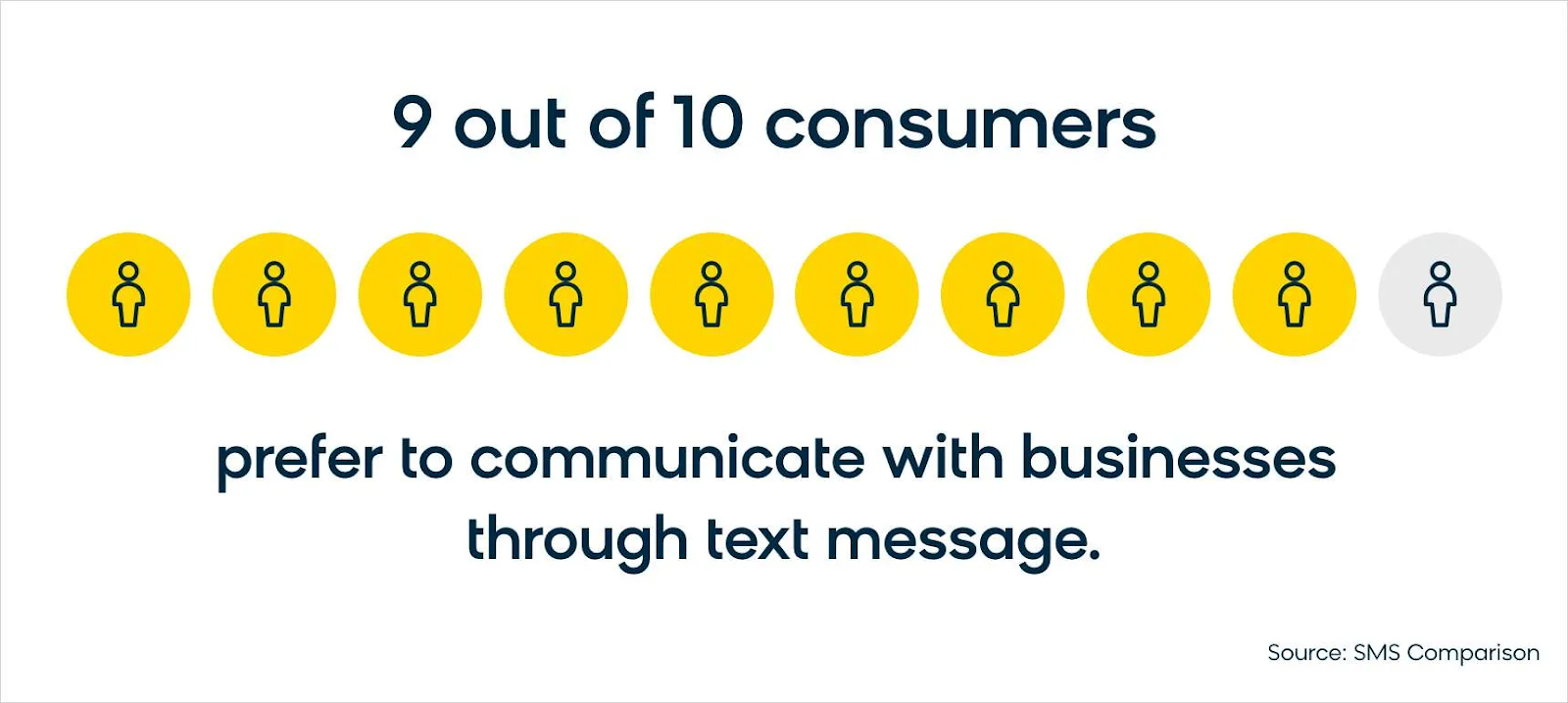
9 out of 10 consumers prefer to communicate with businesses through text message. Whether it’s through sales promotions, alerts, or back-and-forth communication, customers have already adopted texting as a worthwhile way to connect.
Read This Next: Everything You Need To Create the Best SMS Marketing Campaigns
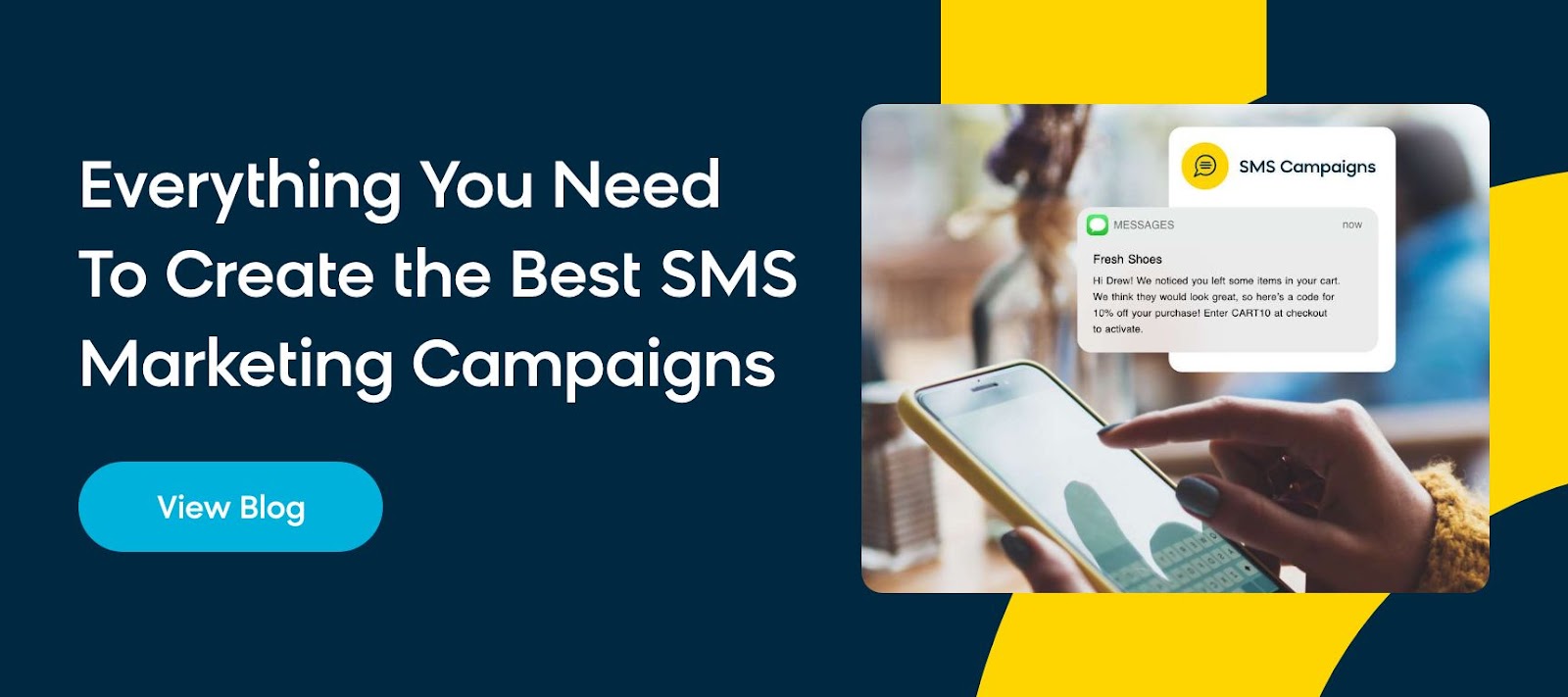
And with an average click-through rate (CTR) of 19%, it’s easy to see why text messaging is one of the most rapidly growing marketing channels.
With so much potential and so many promising use cases, it’s in every business’ best interest to invest in SMS marketing. From cart abandonment messages to personalized deals and discounts, there’s no shortage of rewarding campaigns that can optimize your mobile marketing strategy.
Mobile Apps and Push Notifications
Mobile apps are the brass tacks of mobile marketing simply because they are the predominant way that mobile users interact with their phones. The average smartphone owner uses 10 apps per day, dedicating over four hours of their time and attention to app use.
With this kind of attention-grabbing power, apps are an enticing channel for businesses. But with so many apps to compete with, it’s vital to keep customers coming back to your app and consistently engaging with your brand — which is exactly what push notifications can offer.
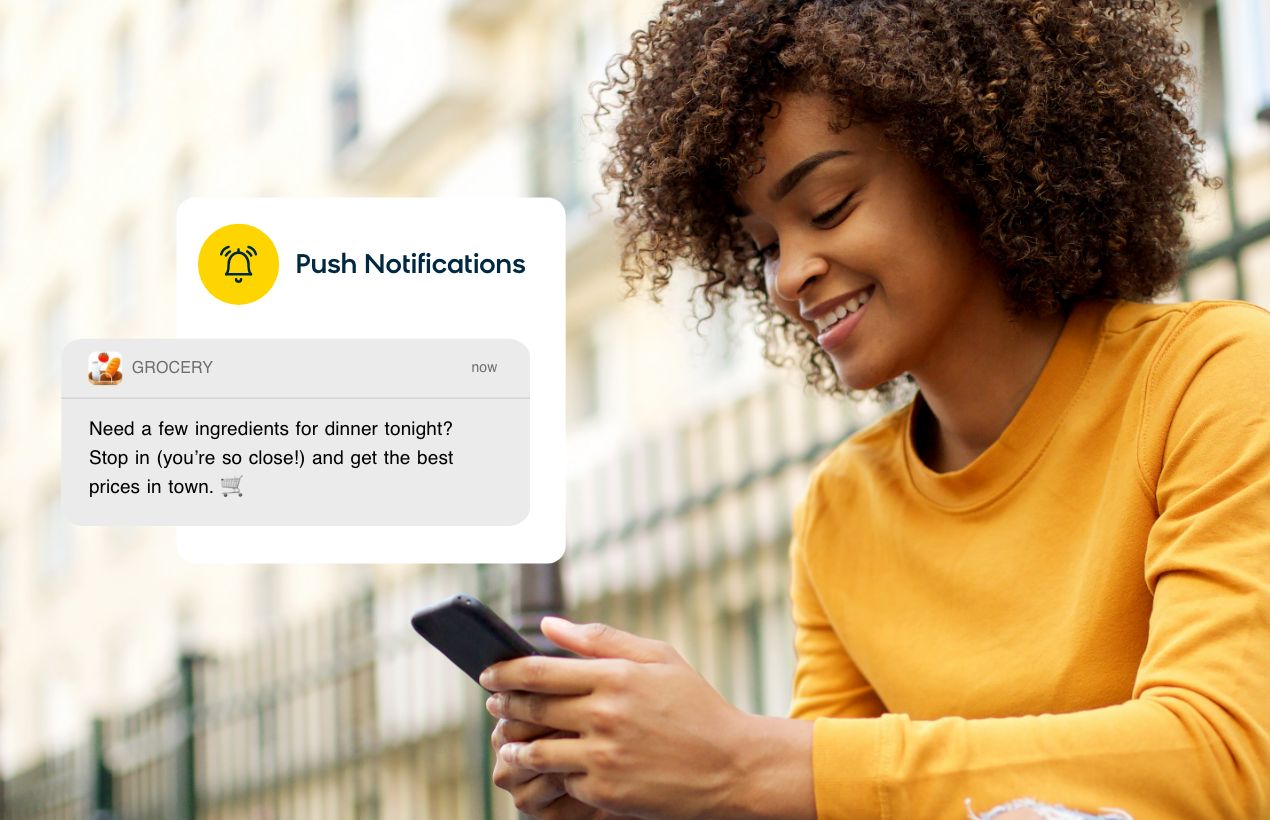
Push notifications are sent right to your user’s device, cutting through the clutter to reach your audience on their home screen. For ecommerce businesses that have an app for their customers to download and use, this messaging channel provides an easy win for your marketing efforts. It’s a great opportunity to increase your reach, grow your customer engagement, and boost conversions.
Push notifications really shine when used in timely, hyper-relevant mobile marketing campaigns. Informative messages, location-based marketing campaigns, and personalized recommendations are great ways to use this channel effectively. And these types of focused campaigns are simple to sync with your overall strategy.
Read This Next: The Ultimate Guide to Mobile Push Notifications for Ecommerce Businesses
Email Marketing
You might not immediately think of email as a mobile marketing channel, but the facts say otherwise.
More than half of all emails are opened on a mobile device, and just seeing your emails on a smartphone or tablet can increase your audience’s click-through rates — people who view emails via mobile are 65% more likely to follow your CTA and view your website.
If you want your mobile marketing strategy to succeed, you need to make sure your emails are designed and optimized to look just as good on a smartphone or tablet as they do on a desktop.
To create mobile-friendly emails, you just need to keep the mobile-device viewing experience in mind. Mobile devices display fewer characters than desktop computers for subject lines and preheader text, so keeping these short and sweet is best practice.
The same goes for your email content — no one wants to read a wall of text on mobile, so short messaging, properly sized images to break up text, and clear calls to action are ideal.
Read This Next: 5 Elements of a Successful Ecommerce Email Marketing Strategy
Mobile Content Marketing
Mobile content marketing is another approach that's rapidly gaining traction in the ecommerce world. It involves crafting and distributing valuable content to engage mobile users, drive conversions, and build brand loyalty.
Mobile content marketing starts with understanding your audience's habits and preferences. Recognize that your customers are often on the go, seeking quick, digestible content that fits within their busy schedules. This could be in the form of a mobile version of an engaging blog post, captivating videos, or timely push notifications. The key is to deliver this content at the right time and through the right channels, ensuring that it's relevant and easily accessible on their most-used devices.
This strategy goes beyond just making sales; it's about creating meaningful relationships with your customers. By sharing relevant and valuable content, you provide more than just a product or service — you offer solutions, insights, and experiences. This not only enhances your brand's reputation but also fosters customer loyalty and trust.
Mobile Marketing Strategy Tips
Because the channel is so unique, it is important to consider that not everything about your mobile marketing strategy will be the same as your other types of marketing. Understanding these differences will be key to your mobile strategy’s success.
Here are some tips and tricks to help:
Acknowledge Mobile as Its Own Unique Format
Don’t treat mobile like an extension of your other marketing efforts. It needs to be more than an afterthought for your ad strategy, email campaigns, or site experience.
A phone is arguably the most personal device that each of us owns, and there’s little tolerance for impersonal communications from today’s consumer. They expect your messaging and mobile experience to be personal, guided by data, and highly relevant.
Read This Next: Ecommerce Personalization: Your Complete Guide
Be Bold in Your Mobile Marketing Strategy
Don’t be afraid to mix things up. Since mobile is such a singular medium, there’s room for experimentation and testing to see what works for your brand.
Don’t assume that what works well for your competitors or a business in a different market will work for you. Try things out and learn from the results.
Understand Your Audience
Fully knowing your target audience should always influence your mobile advertising. Identifying who your audience is, how you reach them, and what content you serve them is vital for a strong mobile marketing strategy.
Mobile offers a distinct opportunity for your marketing efforts. Our mobile devices are with us everywhere we go, and you can capitalize on how connected your audience is to their phones through focused, purposeful messages.
Creating campaigns that offer real-time benefits for your audience, like time-sensitive deals, prompt updates on their orders, or helpful reengagement campaigns, is a strong step towards getting the most ROI from your mobile marketing.
Read This Next: How Reengagement Campaigns Boost Revenue
Be Clear and Concise
Mobile devices are succinct by design. They have small screens and an agile user interface, and mobile users are trained to scroll past or navigate through things at a rapid pace to find what they’re looking for.
Businesses need to consider this when crafting content to present to a mobile audience — short and sweet is the most productive approach.
Let Bloomreach Engagement Power Your Mobile Marketing Strategy
In the fast-paced and ever-evolving world of ecommerce, staying ahead of the game requires a robust and innovative marketing strategy. Mobile marketing has emerged as a critical component of this strategy. It allows businesses to connect with their customers in a more personalized and engaging manner, driving sales, fostering loyalty, and setting themselves apart in a crowded marketplace.
But crafting an effective mobile marketing strategy is no small feat. It requires a deep understanding of your customers' behaviors and preferences, a knack for creating compelling, mobile-friendly content, and the ability to deliver that content at just the right moment. That's where Bloomreach Engagement comes in.
With Bloomreach Engagement, you can take your mobile marketing strategy to new heights. Our platform is designed to help you understand your customers on a deeper level, create engaging content that resonates with them, and deliver it in a way that drives engagement and conversions.
Want to learn more about the game-changing benefits that Bloomreach Engagement can offer your business? Find out how we can help you drive more impactful results with our mobile app marketing and mobile messaging features.
Found this useful? Subscribe to our newsletter or share it.

